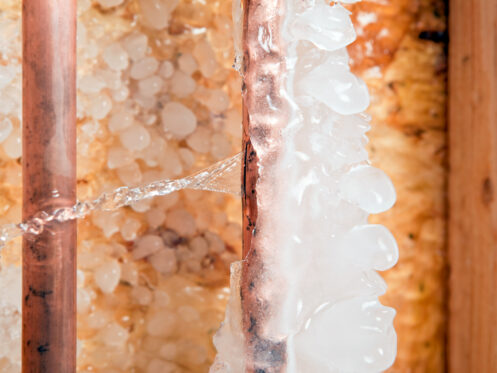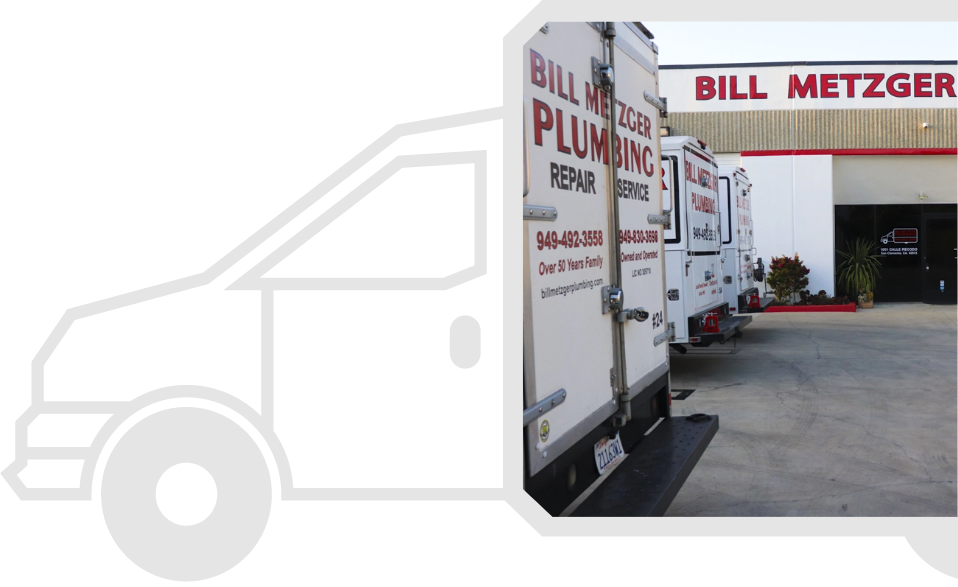Pipes are at an elevated risk of freezing during the winter in many other parts of the country, but the risk is obviously much lower in our area due to the milder climate. If you live along the coast in Orange County, you usually don’t need to worry much about your pipes freezing. If you live at a slightly higher elevation, such as Lake Elsinore and the Sun City area, there is a greater chance of experiencing frozen pipes. But should an extreme cold spell occur, there is always a chance that your pipes can freeze no matter where you live, so it’s important that you know what to do to help prevent it from happening.
How to Prevent Outdoor Plumbing From Freezing
Outdoor pipes and plumbing fixtures, such as hose bibs and sprinkler systems, will obviously freeze more easily, so you should take some precautions any time freezing temperatures are predicted. The easiest way to keep your outdoor pipes from freezing is to shut off the water and then drain the pipes. Every water line that runs to a hose bib, outdoor sink or other outdoor fixture will have a shut-off valve attached to it that is located inside your house. Once you shut off the water valves for your outdoor plumbing, open each fixture to allow all the water to drain out of the pipes.
If you don’t want to shut off the water, you can also place an insulating cover over each hose bib. However, if the weather is predicted to fall far below freezing, your best bet is to shut off the water and drain the pipes just to be safe.
If you have an underground sprinkler system that you still use during the winter, you should also shut off its water supply anytime freezing temperatures are in the forecast. If the weather is predicted to be much colder than normal, you may also want to have a professional plumber blow the water out of all the underground lines to ensure they don’t freeze and break. If you don’t, you may end up having to have your sprinkler system dug up and some or all the lines replaced.
Insulate Exposed Pipes in Unconditioned or Colder Areas of the Home
There is less of a risk of the pipes inside the main areas of your home freezing, but exposed pipes in cold or unconditioned areas, such as a basement, crawl space and attic, can easily freeze in much colder weather. Homes that are built on a concrete slab foundation often have their water heater in the garage, and this is also sometimes where the main water line comes into the house. If your garage isn’t heated, any pipes located there can also end up freezing.
The easiest way to prevent pipes in these cold, unconditioned areas from freezing is to insulate them. Completely wrapping all the exposed water lines in foam pipe insulation will block out the cold air. If the pipes aren’t insulated, cold air can easily penetrate through them and cause the water inside them to freeze. Most homes have copper pipes, which will freeze more easily than other types of piping. This is because copper is an extremely poor insulator, which means it can quickly become cold when exposed to freezing temperatures.
Open Your Faucets
Any time the weather is around 20 degrees or colder, it also helps to open every faucet, so the water is just running slightly. This way, there will be a steady flow of water moving through the pipes. If the faucet is shut off, the standing water in the pipe will freeze much more easily than if the water keeps flowing.
Open Cabinet Doors
In much colder temperatures, the exposed pipes in the cabinets underneath bathroom and kitchen sinks will often end up freezing. This is because the cabinet doors block warm air from getting inside, which can lead to the inside of the cabinets getting quite cold. Opening the doors to the cabinets will help to keep the pipes warmer.
Leave Your Thermostat Set to 55 Degrees or Higher
The warmer your home stays, the less risk there will be of your plumbing freezing. The problem with turning your thermostat down too low is that most homes have lots of different places where air leaks in from outside. If you had your thermostat set to around 50 degrees, the cold air coming inside can cause temperatures in some areas to drop below freezing. The best way to prevent this from happening is to never set your thermostat below 55-60 degrees.
Winterize Your Plumbing System Before Going on Vacation
If you plan on being away from your home for an extended period over the winter, you may also want to hire a plumber to fully winterize your plumbing system. If there is a cold snap and your heating system suddenly goes out for any reason when you’re away, your home will eventually become just as cold as it is outside, and your pipes can freeze.
Having a plumber winterize your plumbing will ensure that your pipes remain protected while you are away. This is because the plumber will first shut off the water coming into your home and then completely drain all the water out of your pipes. They’ll then blow out every water line just to make sure that no water remains. They’ll also drain your toilet tanks and bowls, which is important since the porcelain can easily crack if the water freezes. Shutting off and draining your water heater is also essential for ensuring it can’t freeze, as tank water heaters will usually rupture if the water in them freezes.
What to Do If Your Plumbing Freezes
If you take the proper precautions, you usually don’t need to worry about dealing with a frozen pipe. If you don’t do anything and you have a pipe that freezes, it is essential that you contact a plumber immediately. This is because frozen pipes are likely to burst and start leaking. As water freezes, it quickly expands and can put enough extra pressure on the pipe that it bursts or splits open. This is why you should also shut off your water if you have a frozen pipe to prevent your home from flooding if the pipe does burst.
If you have a frozen pipe or a pipe that bursts, you can trust the certified plumbing experts at Bill Metzger Plumbing for help. We offer 24/7 emergency services, and you can count on us to professionally handle all your plumbing repair needs. We also specialize in plumbing and gas line installation, and our team can also help if you need any drain, sewer or water heater services in San Clemente, Orange County and western Riverside County. No matter what type of plumbing service you need, give us a call to get the expert help you deserve.



 Today
Today 